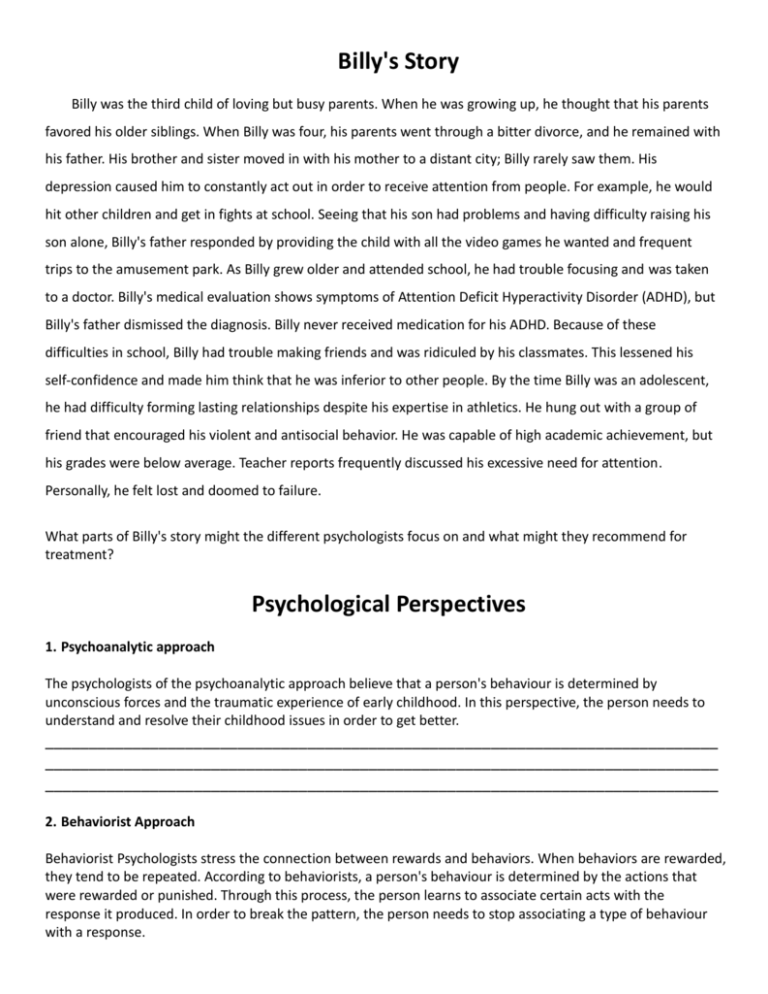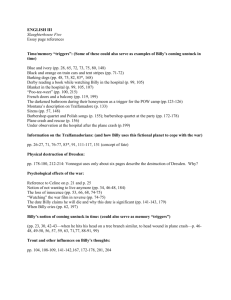5 Psychological Perspectives
advertisement

Billy's Story Billy was the third child of loving but busy parents. When he was growing up, he thought that his parents favored his older siblings. When Billy was four, his parents went through a bitter divorce, and he remained with his father. His brother and sister moved in with his mother to a distant city; Billy rarely saw them. His depression caused him to constantly act out in order to receive attention from people. For example, he would hit other children and get in fights at school. Seeing that his son had problems and having difficulty raising his son alone, Billy's father responded by providing the child with all the video games he wanted and frequent trips to the amusement park. As Billy grew older and attended school, he had trouble focusing and was taken to a doctor. Billy's medical evaluation shows symptoms of Attention Deficit Hyperactivity Disorder (ADHD), but Billy's father dismissed the diagnosis. Billy never received medication for his ADHD. Because of these difficulties in school, Billy had trouble making friends and was ridiculed by his classmates. This lessened his self-confidence and made him think that he was inferior to other people. By the time Billy was an adolescent, he had difficulty forming lasting relationships despite his expertise in athletics. He hung out with a group of friend that encouraged his violent and antisocial behavior. He was capable of high academic achievement, but his grades were below average. Teacher reports frequently discussed his excessive need for attention. Personally, he felt lost and doomed to failure. What parts of Billy's story might the different psychologists focus on and what might they recommend for treatment? Psychological Perspectives 1. Psychoanalytic approach The psychologists of the psychoanalytic approach believe that a person's behaviour is determined by unconscious forces and the traumatic experience of early childhood. In this perspective, the person needs to understand and resolve their childhood issues in order to get better. _____________________________________________________________________________ _____________________________________________________________________________ _____________________________________________________________________________ 2. Behaviorist Approach Behaviorist Psychologists stress the connection between rewards and behaviors. When behaviors are rewarded, they tend to be repeated. According to behaviorists, a person's behaviour is determined by the actions that were rewarded or punished. Through this process, the person learns to associate certain acts with the response it produced. In order to break the pattern, the person needs to stop associating a type of behaviour with a response. _____________________________________________________________________________ _____________________________________________________________________________ _____________________________________________________________________________ 3. Cognitive Approach Cognitive theories feature the mental processing of the individual. To these psychologists, a person's difficulties often come from false perceptions of reality and irrational beliefs. Cognitive theorists believe that people develop incorrect ideas of the world and themselves and then base their behaviors on what they believe. In order to fix this problem, cognitive psychologists believe a person needs to confront their believes and change their thinking. _____________________________________________________________________________ _____________________________________________________________________________ _____________________________________________________________________________ 4. Humanistic Approach The humanist psychologists talk about the fact that people are in control of their own destiny. According to them, one needs to satisfy their basic needs and then strive for personal achievement. A person’s self-image is important for them to be successful. A person also needs to believe in their own self-worth. _____________________________________________________________________________ _____________________________________________________________________________ _____________________________________________________________________________ 5. Biological Approach These psychologists stress the genetic medical and neurobiological parts of a person. They believe that these biological factors influence behaviour. Hormones, chemicals and psychological disorders help determine a person’s actions and behaviour. ‘ _____________________________________________________________________________ _____________________________________________________________________________ _____________________________________________________________________________ 6. Sociological Approach These psychologists stress the importance of the environment and people that a person interacts with. In particular, a person’s behavior is a result of the social influence of friends, family and a person’s cultural in general. _____________________________________________________________________________ _____________________________________________________________________________ _____________________________________________________________________________






